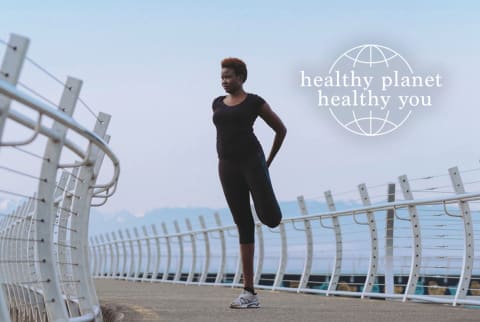Advertisement
Beyond Eco-Anxiety: How Climate Change Contributes To Depression & Grief


Beyond eco-anxiety: Quantifying climate change's impact on mental health
"Eco-anxiety" has become a catchall term to describe feelings about a warming world—but new research reinforces that climate change incites a range of complex emotions beyond anxiety. After reviewing the growing body of research on climate and mental health, a team out of Italy concluded that having a higher level of perception and awareness of climate change tends to correlate with a higher risk of depression, stress, adjustment disorder, substance use, and grief—as well as lower well-being and resilience. This highlights the urgent need for climate-informed therapists, especially in communities that are most vulnerable.
Why you might soon find your doctor roaming the forest
Shinrin-yoku, or "forest bathing," is the Japanese philosophy of slowly and mindfully strolling through the forest. And it's been associated with some pretty impressive benefits—from short-term stress relief2 to longer-term improvements in immune function3. A new study guided a cohort of 15 people who could really use these perks—medical residents—through shinrin-yoku to see whether the experience changed how they approach their work and patient care. Sure enough, the residents reported feeling more calm and creative and less anxious and depressed following the forest foray.
Learn more about the important role that doctors play in our climate future here, and dig into this new study here4.
Air pollution is threatening children's ability to learn—potentially into adulthood
As air pollution increases across much of the world, more research is digging into its human cost. A disturbing new systematic review in Current Environmental Health Reports found that ubiquitous pollutants like particulate matter and nitrogen dioxide seem to negatively impact children's cognitive abilities. Some studies have even found that air pollution exposure is associated with alterations in brain structure and function that can extend into adulthood. As such, researchers call for policies that focus on decreasing air pollution and traffic noise around schools.
...But access to green space supports their emotional processing & well-being
The Current Environmental Health Reports review also suggested increasing green space around schools, which can be a boon to children's mental health. It may help out with their ability to process emotions (like, say, those topsy-turvy ones about climate change) in a healthy way too. Separate research recently found that young kids who have access to more green space are less likely to exhibit "internalizing behavior," or keep their problems and emotions bottled up.
Monthly theme: Be naturally mindful
Meditation has never come easily to me, and I've struggled to get in the groove of a consistent practice. But recently, psychologist Nina Smiley, Ph.D., showed me a quick way to infuse more mindfulness into my daily walks, and it's had a powerful impact on my stress levels.
There's research to show that beginners tend to find it easier to stick with meditation programs that are conducted outdoors6, likely because nature provides plenty for us to gently rest our attention on. Smiley, the co-author of Mindfulness in Nature and director of mindfulness programming at Mohonk Mountain House, taught me how to take advantage of this through a simple outdoor meditation exercise:
- Find a safe, comfortable place to sit or stand outdoors, preferably with a view of natural features like trees, water, or open fields.
- Take 1-2 minutes to slow down your breath. You don't necessarily need to follow a specific breathwork routine—Smiley just encourages focusing on taking full, gentle breaths in, followed by slow, gentle breaths out.
- After a few minutes, open your eyes ever so slowly. Look directly in front of you at first, noticing the colors, textures, and sounds in your immediate area. Gradually expand your gaze outward, taking more stock of your surroundings as you go. Notice the colors that appear more vibrant and the textures that have more complexity than they did when your mind was more cluttered.
This practice is simple enough for me to do daily but effective enough to always calm my mental chatter and reveal something new to love about my environment. As Smiley says, "It's amazing what you can see without the filter of thought."
6 Sources
- https://www.mdpi.com/2254-9625/14/1/14
- https://pubmed.ncbi.nlm.nih.gov/31001682/
- https://www.ncbi.nlm.nih.gov/pmc/articles/PMC2793341/
- https://journals.sagepub.com/doi/10.1177/27536130241228181
- https://link.springer.com/article/10.1007/s40572-024-00431-0
- https://www.ncbi.nlm.nih.gov/pmc/articles/PMC7438830/